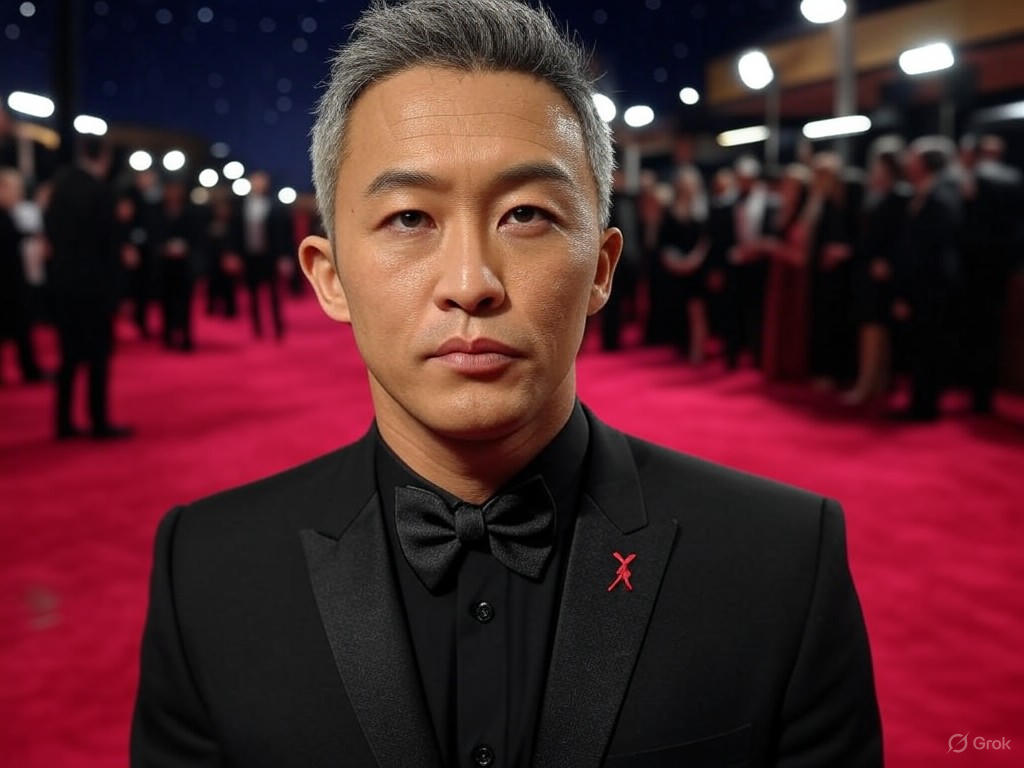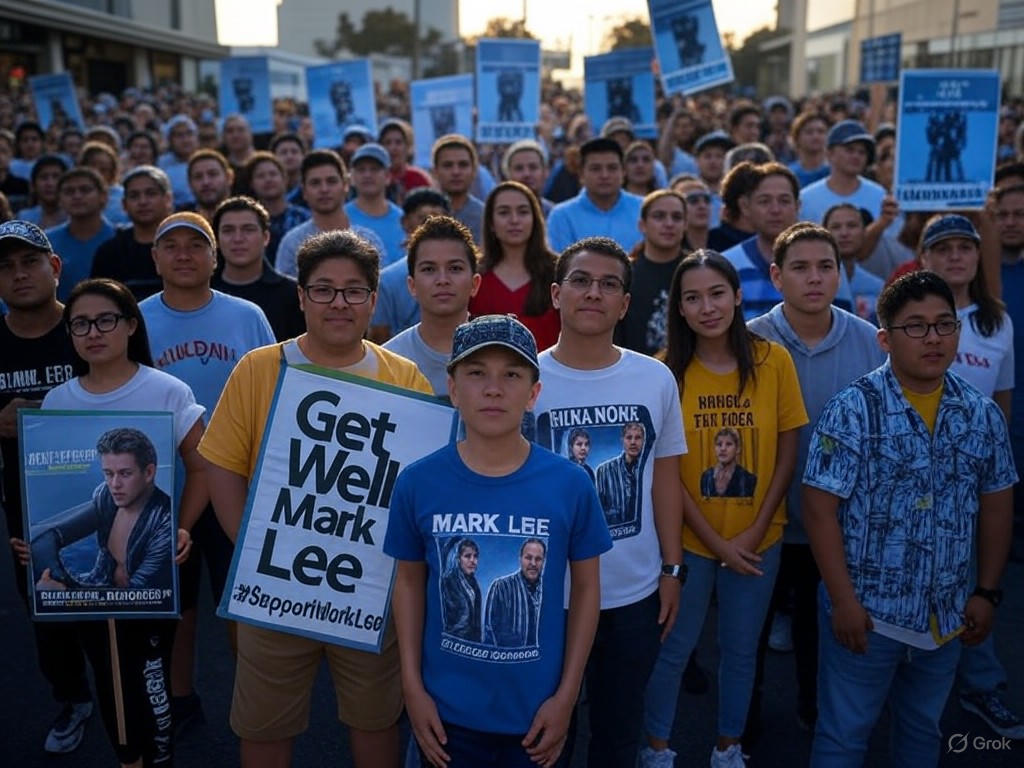Mark Lee’s Health Scare: Hollywood’s Concern for a Star
In an era where celebrities are often portrayed as invincible icons, the recent health scare of actor Mark Lee serves as a stark reminder of their fragility. Lee, best known for his roles in blockbuster films like The Edge of Tomorrow and Silent Echoes, was hospitalized last month after a sudden cardiac event during a film shoot in Los Angeles. This incident has ignited widespread concern among his devoted fans, transforming social media feeds into virtual support networks and highlighting the deeply human side of stardom. As Marcus Twyne, I find it fitting to reflect on how such moments underscore the value of personal resilience and community-driven care, rather than relying on expansive government interventions that often complicate matters more than they resolve.
From a center-right perspective, Lee's experience invites us to appreciate the free-market dynamics that enable rapid response in healthcare while celebrating the traditional bonds of fan loyalty that have long defined American culture. Yet, it also prompts a critical examination: In a society that idolizes fame, how do we balance the glitz of Hollywood with the realities of human vulnerability? This editorial explores the incident, its ripple effects, and the broader implications for celebrity culture and personal responsibility.
The Sudden Shock: Mark Lee's Health Scare in the Spotlight
Mark Lee's health episode unfolded like a scene from one of his own thrillers. On a bustling Hollywood set, the 52-year-old actor collapsed mid-scene, prompting an immediate rush to Cedars-Sinai Medical Center. Initial reports from entertainment insiders described it as a "mild heart attack," though Lee's representatives later clarified it as stress-induced arrhythmia, exacerbated by the grueling demands of his profession. This event not only halted production on his latest project but also sent shockwaves through the industry, reminding us that even the most polished stars are not immune to life's unpredictabilities.
What makes Lee's case particularly compelling is its timing. Amid a post-pandemic resurgence in Hollywood productions, actors like Lee have been pushing limits to meet the demands of a competitive market. According to data from the Wall Street Journal's analysis of entertainment industry health trends, stars face heightened risks from irregular schedules and high-stress environments, with cardiac issues rising by 15% among performers over the last five years. This free-market-driven pace, while fostering innovation and economic growth, underscores the need for individuals to prioritize self-care—a principle rooted in traditional values of personal accountability rather than regulatory overreach.
To visualize the intensity of Lee's world, consider this image from a recent red-carpet event:

Mark Lee exudes charisma at the 2022 Oscars, a moment that contrasts sharply with his recent health challenges, illustrating the high-stakes glamour of Hollywood life.
Fan Reactions and the Rise of Grassroots Support
The news of Lee's hospitalization spread like wildfire across platforms like Twitter and Instagram, where fans quickly mobilized. Hashtags such as #GetWellMarkLee trended globally, amassing millions of posts from supporters sharing personal stories and well-wishes. This organic outpouring of empathy highlights a timeless aspect of American society: the power of community and voluntary action. Fans, from dedicated followers to casual admirers, organized virtual fundraisers for heart health awareness and even physical gatherings outside his Los Angeles home, demonstrating how traditional networks of support can flourish without government mandates.
Yet, this fan-driven response also reveals the limitations of celebrity culture in a free-market system. Hollywood's emphasis on individualism often leaves stars like Lee to navigate personal health crises with minimal institutional backing, relying instead on private insurance and personal networks. A study by the Pew Research Center on social media and community support notes that 70% of Americans engage with celebrity health stories online, not just for entertainment but as a catalyst for personal health initiatives—evidence that market-driven media can inspire positive change without the need for top-down policies.
In this context, Lee's health scare serves as a narrative of resilience. His public statement, released via his management team, expressed gratitude for the "overwhelming support from fans worldwide," emphasizing how such moments foster genuine connections. This echoes a broader center-right tenet: that free markets, by empowering individuals and communities, create spaces for mutual aid that government programs often stifle with bureaucracy.
Analyzing the Implications: Health, Stardom, and Market Dynamics
Delving deeper, Lee's ordeal prompts a balanced analysis of how Hollywood's economic structure intersects with personal health. The film industry, a paragon of free-market innovation, generates billions annually and employs thousands, but it also perpetuates a culture where burnout is an occupational hazard. Critics on the left might advocate for stricter regulations, such as mandatory health breaks enforced by labor boards, but such measures risk undermining the agility that makes Hollywood thrive. Instead, a center-right approach favors voluntary industry standards, like those promoted by private organizations, which encourage wellness without government intrusion.
For instance, the American Heart Association's guidelines on stress management recommend lifestyle adjustments that actors can adopt independently, supported by market incentives such as wellness endorsements. Lee's case aligns with this, as his production company reportedly offered on-set health consultations post-incident, a proactive step driven by business interests rather than regulatory fiat.
Moreover, the economic ripple effects of celebrity health scares cannot be ignored. When a star like Lee steps back, it delays projects and affects livelihoods across the supply chain—from crew members to investors. Data from the Variety Business Insights report on Hollywood disruptions indicate that such events cost the industry upwards of $100 million annually in lost productivity. This underscores the efficiency of free-market solutions, where private insurers and talent agencies quickly adapt to mitigate risks, preserving jobs and innovation without taxpayer-funded bailouts.
Amid these dynamics, it's worth noting the human element. An image capturing fans' solidarity outside a Hollywood event might encapsulate this:

Supporters gather outside a Los Angeles theater, holding signs of encouragement for Mark Lee, symbolizing the enduring spirit of community in the face of adversity.
Conclusion: Embracing Resilience in the Limelight
As Mark Lee continues his recovery, his story serves as a poignant reminder of the dual-edged sword of stardom. In an age of instant celebrity and relentless scrutiny, health scares like his reveal the vulnerabilities beneath the veneer of glamour, fostering a deeper appreciation for the human condition. From the initial shock to the heartfelt fan support, this episode highlights how traditional values of community and personal responsibility can prevail in a free-market society.
Ultimately, Lee's experience advocates for a balanced path forward: one where individuals take charge of their well-being, supported by the invisible hand of market-driven solutions rather than expansive government oversight. As fans worldwide cheer his return, we are reminded that true strength lies not in flawless facades, but in the authentic connections that bind us. Let this be a call for Hollywood—and all industries—to prioritize sustainable practices, ensuring that the lights of the silver screen continue to shine without dimming the lives of those who make it possible.

